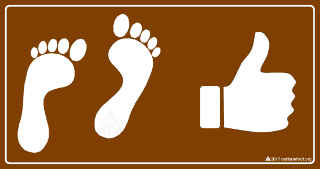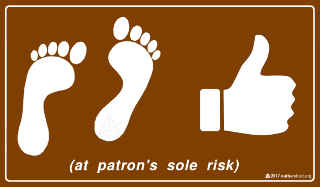

(right-click, save-as)
(right-click, save-as)
When shoes cause discomfort or even medical duress, as they easily can for many people, the establishment is now liable for that and has also directly diminished a visitor's enjoyment of services for no legally supportable reason. And when "acceptable" but otherwise unspecified footwear increases a patron's risk of suffering a slip-and-fall incident, that's clearly not what the establishment intended but it CAN AND DOES HAPPEN that way. Let's also not forget that a business can be sued for discrimination or ADA violations, forcing it to defend the case regardless of outcome.
Someone who arrives already barefoot clearly knows what they are doing, and is far better off being left alone with regard to that lifestyle choice instead of being treated like an irresponsible five-year-old. They are also the people least likely to attempt legal action over some minor premises deficiency. They are there in good faith to spend money -- it is foolish to reject that, and only wastes time and fosters ill will when you do. Establishing a broad foot-friendly policy, rather than falling back on the traditional but misguided common prejudice, brings far more overall benefit to a business or facility and does not bring any undue operational risk -- in fact, it removes some.
Here are some simple, minimal-cost steps to take:
A number of high-profile corporations have already taken some of these steps. Wal-Mart, Starbucks, Dunkin Donuts, Target, Kroger, Walgreens, Trader Joe's -- to name a few -- have made the sensible decision that they simply do not discriminate against their customers, over footwear or any other excuse. With precedent of that caliber, any establishment should feel completely confident welcoming in its patrons with or without shoes.
 |
 |
| Download:
lrok1_p.png
(right-click, save-as) |
Download:
lrok2_p.png
(right-click, save-as) |
Or design your own presentation, anything from simple text saying "barefooters welcome" or "bare feet at own risk" or the like, up to custom business-branded graphics expressing the same things. Whatever form your change for the better takes, using signs like these or the simple lack of any signs about footwear at all and appropriate knowledge behind that, your clients and colleagues will definitely appreciate your reaffirmed respect for individual liberty and healthy living.
| Contact the author |